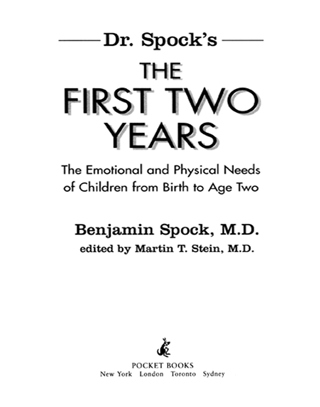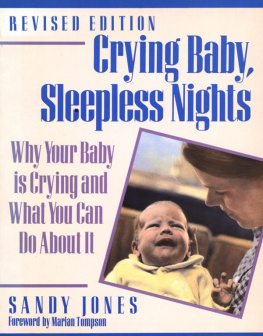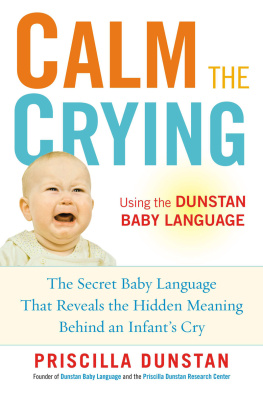Dr. Spocks THE FIRST TWO YEARS
Turn to Dr. Spocks The First Two Years for invaluable advice on topics vital to all new parents:
- The many meanings of your newborns cries
- Separation anxiety
- Helping your child cope with unfamiliar faces
- Understanding babys moods and emotions
- Sibling jealousy
- Sleep problems
- Dealing with the stresses of parenthood
and more!
B OOKS BY B ENJAMIN S POCK, M.D.
Dr. Spocks Baby and Child Care
Dr. Spock on Parenting
Dr. Spocks The First Two Years
Dr. Spocks The School Years
Published by POCKET BOOKS

The sale of this book without its cover is unauthorized. If you purchased this book without a cover, you should be aware that it was reported to the publisher as unsold and destroyed. Neither the author nor the publisher has received payment for the sale of this stripped book.
An Original Publication of POCKET BOOKS

POCKET BOOKS, a division of Simon & Schuster, Inc.
1230 Avenue of the Americas, New York, NY 10020
www.SimonandSchuster.com
Copyright 2001 by drspock.com, Inc.
All rights reserved, including the right to reproduce this book or portions thereof in any form whatsoever.
For information address Pocket Books, 1230 Avenue of the Americas, New York, NY 10020
ISBN: 0-7434-1122-6
eISBN-13: 978-0-743-43104-0
ISBN-13: 978-0-743-41122-6
First Pocket Books trade paperback printing August 2001
10 9 8 7 6 5 4
POCKET and colophon are registered trademarks of Simon & Schuster, Inc.
Book design by Helene Berinsky
Front cover photo by VCG/FPG International
Printed in the U.S.A.
This book is comprised of a series of essays previously published individually in Redbook (1985-1992) and Parenting (1992-1998).
For information regarding special discounts for bulk purchases, please contact Simon & Schuster Special Sales at 1-800-456-6798 or business@simonandschuster.com
This book is dedicated to
the mothers and fathers who taught Dr. Spock about the growth and emotional development of their children;
Dr. Benjamin Spock, who shared with me, during the last year of his remarkable life, the evolution of his ideas about the development of children;
Mary Morgan, Dr. Spocks widow, who steadfastly maintains his legacy for the children and parents of future generations;
my parents, Gertrude and Gerald Stein, who guided the lives of their children with a respect for their independence and an intuitive understanding of Dr. Spocks reminder to parents to trust yourself you know more than you think you do; and
my wife, Mary Caffery, and children, Joshua, Benjamin and Sarah, who continue to teach me about the developmental journey of children and young adults.
Acknowledgments
There are many individuals who are important in the development of this book. I am indebted to the pediatricians who shaped my thinking about children, families, and the practice of pediatrics, including Drs. John Castiglione, Louis Fraad, William Nyhan, Samuel Spector, Stanford Friedman, John Kennell, and T. Berry Brazelton. I especially want to thank my colleague, Dr. Suzanne Dixon, with whom I collaborated during a twenty-year period at the University of California San Diego.
There are many other colleagues in the emerging specialty of Developmental and Behavioral Pediatrics who continue to work with me and teach me about ways to assist pediatricians to become more effective in counseling parents and the early recognition and treatment of children with develpmental and behavioral conditions. They include Drs. Michael Reiff, Heidi Feldman, Ellen Perrin, Paul Dworkin, William Coleman, Lane Tanner, Jim Perrin, Mark Wolraich, Esther Wender, William Carey, Ronald Barr, Randi Hagerman, Barbara Howard, Robert Needlman, and David Snyder. My colleagues in San Diego, Philip Nader, Laurel Leslie, Barbara Loundsbury, Dorothy Johnson, Eyla Boies, and Howard Taras continue to support this work.
I also wish to express sincere appreciation to Robert Lescher, Dr. Spocks literary agent for many years. He steadfastly encouraged and guided the publication of this book. Dr. Spock wrote the original articles included in this book for two magazines for parents. Bruce Raskin encouraged and guided the publication as Dr. Spocks editor at Parenting magazine. Sylvia Koner was his editor at Redbook. I am also grateful to Tracy Bernstein, a superb editor at Pocket Books.
Dr. Benjamin Spocks legacy is sustained today at drSpock.com, a company that disseminates his writings and contemporary information for parents. The leadership of that group worked with me and actively encouraged the development of this book. I appreciate the support from Douglas Lee, John Buckley, David Markus, George Strait, and Drs. Laura Janna, Robert Needlman, and Lynn Cates.
Contents
Introduction
For nearly sixty years, from the 1940s to the end of the twentieth century, Dr. Benjamin Spock was the pediatrician to whom parents turned for guidance about a wide variety of child-rearing issues. The popularity of his first book, Baby and Child Care, brought national and international recognition to Dr. Spock for his sound, practical advice and gentle voice. It became the most widely read book on child care ever written.
Today, decades later, it is still the most respected parenting book in the world; and Dr. Spocks other books have been equally celebrated. Although he is gone, millions of parents continue to consult him by virtue of his writings. Why such popularity and success? I think there are three major reasons.
First, his range of subjects was comprehensive, addressing parents concerns about both physical health (for example, nutrition, safety, immunizations, early signs of illness, and home remedies) and psychological health (normal development, parent and sibling relationships, the different experiences of mothers and fathers, the effects of work outside the home on family life, and many others).
Second, a hallmark of his writing is that Dr. Spock spoke to parents. Mothers and fathers often wrote to him with some variation of When I read your book, it is as if you are sitting at my kitchen table talking and listening to me. His focus was always on the parent; he wrote with the assumption that parents are capable, wise, and open to understanding the development and needs of their children. Trust yourself was a theme that guided all of his advice to parents.
The third reason, I believe, for the preeminent place Dr. Spock continues to hold among parents is his respect for change and diversity. He recognized that the way we raise children reflects a cultures values, and that some of our values and perspectives on children and family change over time. Characteristically, he did not tell us the right way to do it. He recognized the inherent value of diversity in families and communities. In every position he took, he respected that diversity.
This book derives from a series of articles published in two magazines, Redbook (1985-1992) and Parenting (1992-1998). The articles have been edited, catalogued, and published in two volumes.
Dr. Spocks The First Two Years addresses the major concerns of new parents, from planning for the arrival of a new baby to problems with sleep, toilet training, and temper tantrums in the second year. The first chapter introduces the idea that babies have a remarkable ability to communicate with parents and others immediately after birth, and aims to improve our ability to respond to and interact with them. In the second chapter, Dr. Spock answers specific concerns raised by parents, from a floppy, misshapen head after birth to a babys breathing patterns, jaundice, spitting-up, and Sudden Infant Death Syndrome (SIDS).
Next page













